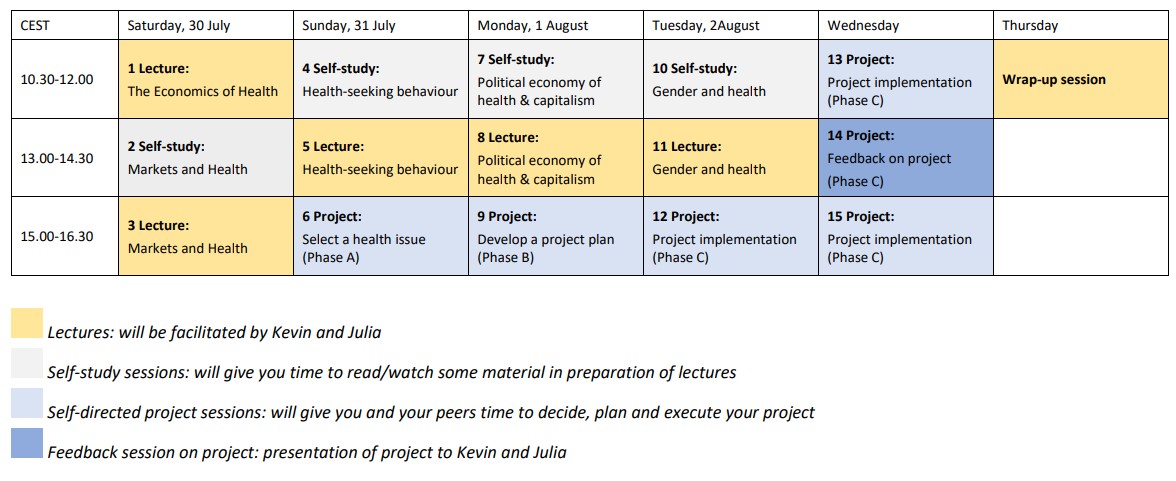Health Economics
Summer Academy 2022 for Pluralist Economics, 2022
This workshop was originally taught at the Summer Academy for Pluralist Economics 2022
Instructor: Julia Ngozi Chukwuma (The Open University, UK)
Short description
Health Economics traditionally involves two distinct strands. One focuses on the application of core neoclassical economic theories of the firm, the consumer and the market to health-seeking behaviour and other health issues. It suggests a role for government intervention only in the case of specific market failures (for example externalities, asymmetric information, moral hazard, and public goods) that distort market outcomes. The second strand is evaluation techniques, used to assess the cost effectiveness of competing health interventions.
However, these two strands apply only one version of economics – neoclassical economics – to health, and do so in a problematic way. In this workshop we aim to critically engage with Health Economics, rooted in neo-classical economic theory, and to present and discuss alternative perspectives relevant to global public health. These include Keynesian, political economy, feminist and ecological perspectives, paying more attention to health inequalities and planetary health. We will touch upon topics such as the shift from the movement for comprehensive primary healthcare throughout the 1970s to the promotion of selective primary healthcare with the ascendency of neo-liberalism in the 1980s to contemporary calls for Universal Health Coverage; the colonial roots and practices of global public health; the increasing reliance on the private sector in healthcare delivery; as well as public policy responses to the COVID-19 pandemic.
Biographies
Julia Ngozi Chukwuma (The Open University, UK)
- Julia is a Lecturer in Economics at the Open University. Her work focuses on the political economy of health policy development and implementation and global efforts to achieve Universal Health Coverage. She is interested in understanding how different interest groups, such as policymakers, civil society organisations, communities, health professionals or international organisations shape a healthcare system and influence how healthcare services are delivered and who can ultimately access them. Her research approach is rooted in understanding the political context in which policies are developed, the causes of economic and social realities within a certain country-context (with a particular focus on Nigeria) as well as issues of inequality and power. Prior to joining the Open University, Julia taught at Queen Mary University of London, SOAS and Goldsmiths University. She also worked with UNICEF’s social policy and emergency teams in Burundi, Mali and Senegal.
Kevin Deane (The Open University, UK)
- Kevin is a Senior Lecturer in Economics at the Open University. He is an interdisciplinary specialist in Economics, Political Economy and International Development. His research interests focus on the political economy of health with an application to the HIV epidemic in Eastern and Southern Africa. He has worked on a range of topics related to HIV including gender, migration, workplace programmes, HIV testing and the relationship between socio-economic status and HIV. He is also interested in the political and social determinants of malaria. He is primarily a qualitative researcher with experience of conducting fieldwork in East Africa. Prior to his role at the Open University, Kevin worked as Lecturer/Senior Lecturer in Global Public Health at Queen Mary University of London, and as Lecturer/Senior Lecturer in International Development at the University of Northampton. He is a Fellow of the Higher Education Academy (FHEA).
Course overview

Course outline
Syllabus and resources |
|
|
Prior to workshop |
Introduction to the Economics of Health
|
|
Session 1 – Lecture Saturday, 30 July 2022 10:30-12:00 |
LECTURE 1: Introduction to the Economics of Health
|
|
Session 2 – Self-study Saturday, 30 July 2022 13:00-14:30 |
Markets and Health
Guiding questions:
|
|
Session 3 – Lecture Saturday, 30 July 2022 15:00-16:30 |
LECTURE 2: Markets and Health
|
|
Session 4 – Self-study Sunday, 1 August 2022 10:30-12:00 |
Health-seeking behaviour
Guiding questions:
|
|
Session 5 – Lecture Sunday, 1 August 2022 13:00-14:30 |
LECTURE 3: Health-seeking behaviour
|
|
Session 6 – Project Sunday, 1 August 2022 15:00-16:30 |
Phase A: Select a health issue [see project brief]
|
|
Session 7 – Self-study Monday, 2 August 2022 10:30-12:00 |
Political Economy of health and capitalism
Guiding questions:
|
|
Session 8 – Lecture Monday, 2 August 2022 13:00-14:30 |
LECTURE 4: Political Economy of health and capitalism
|
|
Session 9 – Project Monday, 2 August 2022 15:00-16:30 |
Phase B: Develop a project plan [see project brief]
|
|
Session 10 – Self-study Tuesday, 3 August 2022 10:30-12:00 |
Gender and health
Guiding questions:
|
|
Session 11 – Lecture Tuesday, 3 August 2022 13:00-14:30 |
LECTURE 5: Gender and health
|
|
Session 12 – Project Tuesday, 2 August 2022 15:00-16:30 |
Phase C: Project implementation [see project brief] |
|
Session 13 – Project Wednesday, 3 August 2022 10:30-12:00 |
Phase C: Project implementation [see project brief] |
|
Session 14 – Project Wednesday, 3 August 2022 13:00-14:30 |
Feedback session: Present project and advocacy campaign [see project brief] |
|
Session 15 – Project Wednesday, 3 August 2022 15:00-16:30 |
Part C: Project implementation [see project brief] |
|
Wrap-up session Thursday, 4 August 2022 10:30-12:00 |
Wrap-up session
|

